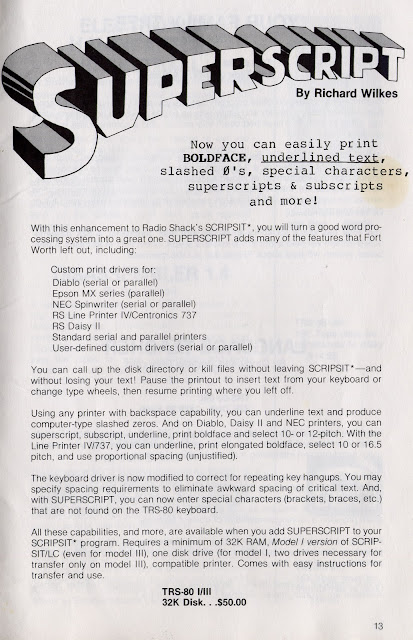We're paging through the Acorn Software Products Fall 1981 catalog, and are now entering the realm of productivity software for the TRS-80 Model I. At the time, a state-of-the-art machine had 48K of memory, a line printer and a couple of floppy disk drives. Acorn published games and productivity software, which was common at the time but has become rare in today's more specialized industry.
Page 12 features one of many spiritual predecessors of Quicken, a program called Money Manager by Andrew P. Bartorillo:
The program apparently runs completely in memory -- it was designed to work on a tape-based system with no random access disk storage available. That's why a 32K system can only handle up to 100 checkbook entries per month, and a 48K system can manage 250. Every byte was precious, and capabilities were doubtless limited. But I'm sure a lot of people found this kind of checkbook balancing and categorization tool valuable, and the household finance category remains healthy today (at least for Quicken -- Microsoft abandoned its MS Money product a few years back.)
Turning to page 13, we see this item, which will take a little bit of explaining:
See, Radio Shack published a decent word processing package called SCRIPSIT, but it was designed to work exclusively with Radio Shack's own printers, and it had a few bugs. SUPERSCRIPT is really just a patch set -- you modify your original SCRIPSIT disks with this software, which fixes some issues and adds some new capabilities. This wasn't common at the time and is even less so today -- generally, applications that cry out for expandability (like Photoshop) now have defined plugin architectures for external developers to use. But in 1981, you backed up your original SCRIPSIT disk, ran the SUPERSCRIPT program to modify it, crossed your fingers and hoped that your new hybrid executable would run. And if you had a Model III with only one disk drive you couldn't even get that far.
Games were an obvious application for early personal computers; tools of practical value really struggled to do something useful within these machines' limitations. But that didn't stop the nascent software industry from trying -- in our next installment, the saga continues.
Sunday, March 27, 2011
Subscribe to:
Post Comments (Atom)







No comments:
Post a Comment